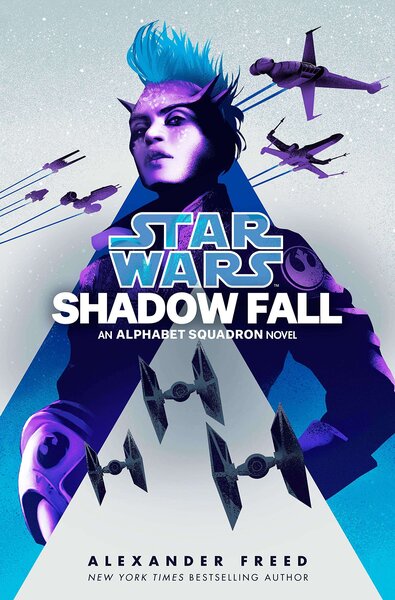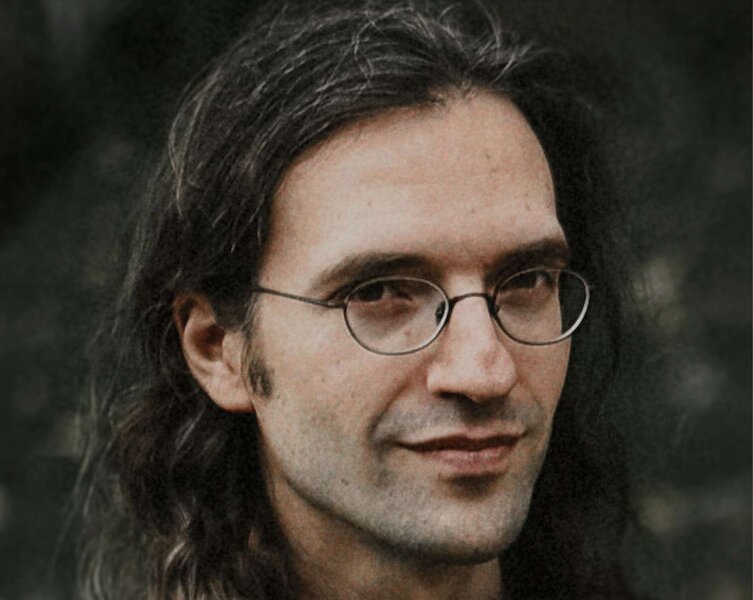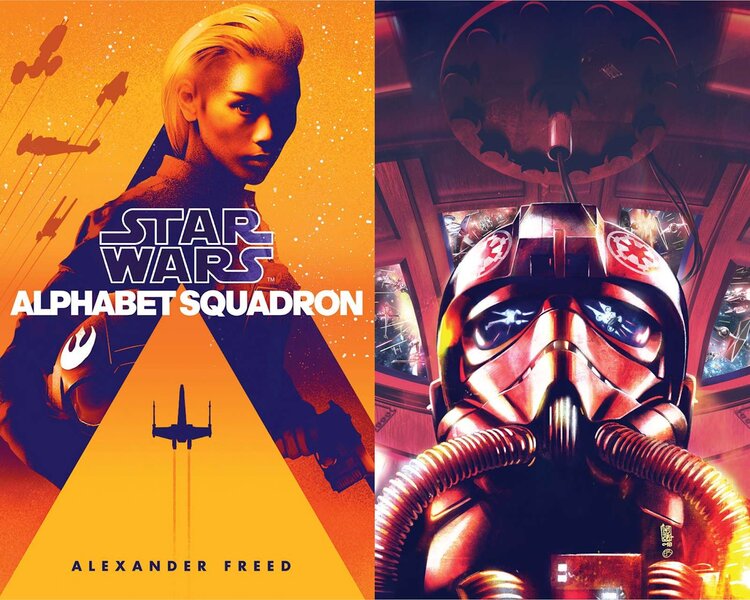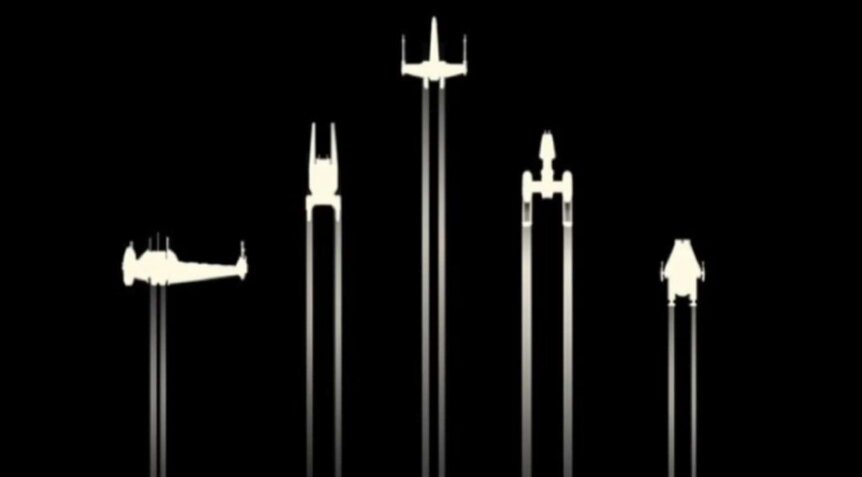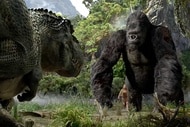Create a free profile to get unlimited access to exclusive videos, sweepstakes, and more!
Yrica Quell and Alphabet Squadron strike back in new Star Wars novel, Shadow Fall
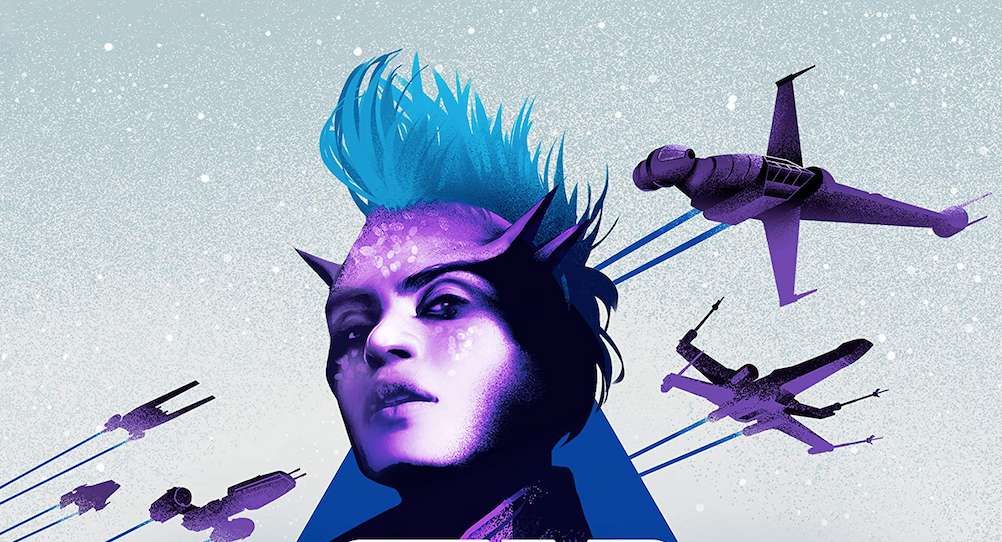
The hottest days of the summer are closing in swiftly like a TIE fighter on a strafing run, and it's the ideal season to strap in for a rousing space fantasy delivered straight from a galaxy far, far away.
Author, comic writer, and video game designer Alexander Freed (Battlefront: Twilight Company) is a seasoned veteran of the franchise, who has delivered a number of inspired novels set in the Star Wars sandbox. Now he's powering up his latest book, Shadow Fall, a sequel to last year's New York Times bestseller Alphabet Squadron, which introduced readers to a ragtag unit of rebel fliers colliding with the Empire's finest after the events in Star Wars: Return of the Jedi. A Marvel crossover miniseries, Star Wars: TIE Fighter, was also released.
This newest offering from Del Rey Books, the second in a planned trilogy, arrives on June 23 and promises more daring missions with starfighter pilot Yrica Quell and her ragtag crew of four New Republic jockeys flying a mismatched collection of A-wing, B-wing, U-wing, X-wing, and Y-wing spaceships. Their nemesis is the imperial major named Soran Keize, whose own notorious Shadow Wing squad is destined to clash with Alphabet Squadron's pilots once again.
SYFY WIRE spoke with Freed about this highly anticipated follow-up to learn about how the novel's plot unfolds, injecting the story with video game flair, creating the black hole system of Cerberon, and offering up good Star Wars stories that resonate with fans.
After the chat, check out an exclusive chapter excerpt and audiobook clip of Shadow Fall below!
Can you take us on a hyperdrive blast through the Shadow Fall plot and how it follows the events of Alphabet Squadron?
Shadow Fall picks up shortly after Alphabet Squadron, around half a year after the Battle of Endor. General Hera Syndulla and the Alphabet pilots (led by Imperial defector Yrica Quell) have been sent to reclaim Cerberon, a multi-planet Deep Core system with a black hole in place of a sun. At the same time, the 204th Imperial Fighter Wing, Shadow Wing, is struggling to rebuild and find purpose under Quell's former mentor, Soran Keize.
Alphabet's primary mission is still to locate and neutralize Shadow Wing, so a new encounter between the two units is inevitable. But the New Republic is now decisively winning the war, and both units have changed substantially since their last run-in. Pilots on both sides are keeping secrets from their comrades. Issues of strategy become entangled in the personal struggles of our protagonists. In short, everything is bound to go wrong.
Your space battles shined in Alphabet Squadron. What cosmic clashes can readers expect on this mission, and where did you draw inspiration from in composing dogfights?
One of my goals with the trilogy was to keep the starfighter combat varied and flavorful, and to clearly differentiate the big set-piece battles in each book. In Shadow Fall we spend a lot of flying time in an urban, planetside environment, experience a clash between battleships, and have a few more on-the-ground action scenes as well.
When it comes to inspiration, the two World Wars are the template for Star Wars aviation but with a very healthy helping of fantasy. Looking to real-world pilot stories is always useful, particularly for capturing the physiological and psychological stresses of flight.
Which elements of your work in comics and video games seep into your original novels?
In some respects, it's the "negative space" that's the biggest influence on me. That is, there are stories and storytelling structures that don't work in video games and comics, and those are what I'm most drawn to in prose.
For example, games in particular tend to be a poor medium for going deep into a character's thought processes. A game's narrative is often strengthened when that thinking emerges from (or is inferred by) the player, rather than being dictated by the author. I love that about games, and I think it can create enormous engagement and richness of characterization! But it means when I write a book I'm passionate about following the winding paths of a protagonist's cogitations and seeing every step of their development.
Or take action sequences. I'm never going to match the visceral excitement of a fight scene in a game or a comic. But I can describe the physical sensations, the stressed muscles and the smells and so forth. Or I can describe the chess match of an enormous battle. Working in other media gives me a better sense of what's in my toolbox.
Operating in your own corner of the Star Wars realm, why is this post-Battle of Endor period the perfect place to explore?
Compared to so many other Star Wars time periods, it's practically uncharted territory. But it's also a time period that opens up a lot of thematically rich questions. What does the Rebellion do when it's finally won? How does the galaxy re-integrate the legions of Imperials who hurt people for decades? What's it like to be someone defined by your willingness to fight oppression who's now part of the conquering regime?
Are there any new worlds or aliens you were especially pleased to introduce in Shadow Fall?
It's a bit trivial, but I'm pretty pleased with how the Cerberon system as a whole came together, aside from the black hole itself you've got Troithe, a sort of Rust Belt Coruscant with a whole continent mined to ruins; Catadra, a temple world with strange religious cults sprouting every which way; and a debris field full of secrets, among other elements. So many Star Wars stories (including most of my own) hop from star to star so fast you don't get to feel much of the weight of local history or culture. It was interesting to spend most of the novel in a single system.
What makes the animosity between Yrica Quell and Major Soran Keize so compelling?
For me, what's compelling about their relationship is that there is no real animosity. Horribly fraught emotions, yes, but neither wants to be in conflict with the other.
Keize represents a life Quell is deeply ashamed of, but he's also the man who saved her, who pushed her out of Shadow Wing when no one else would. She respects him deeply, and when she learns that he's returned to Shadow Wing… well, that would be giving too much away.
After writing in the Star Wars universe for ten years, what have you learned about the limitless appeal of the franchise?
People want good stories. Star Wars fans want good stories, specifically, good stories that reflect aspects of Star Wars that resonate with them. And for most fans, I think, the real appeal of Star Wars isn't in the continuity or the world or even the characters. It's in the emotions those things stir up. The sense of awe, the vision of good and evil clashing in a galaxy full of wonders, the element of strangers becoming family... those are big notions, and there are so many powerful stories that can be told with them.
Can you tease anything about the third Alphabet Squadron book?
Book three is well underway, so while I can't speak to a release date I can say it's happening. The plan is to wrap up the trilogy in an appropriately explosive fashion. Triumphs and tragedies aplenty.
Now enjoy an exclusive chapter excerpt from Star Wars: Shadow Fall published by Del Rey.
By the time their meal was finished, Lark had returned with half a dozen other infantry soldiers. There was no more food in the restaurant's stocks but the troops didn't seem to mind. Tensent produced an armful of Imperial rations out of nowhere — the good sort, the kind TIE pilots had traded favors for aboard the Pursuerand handed them out, calling the troops by name and pouring the last of the wine. The gathering felt less intimate than before but that suited Quell: it allowed her to escape attention.
"Is it true we're going after the governor soon?" one of the soldiers asked, and when Quell inclined her head enough for him to infer agreement, he swore. "Means we actually might win this system, huh?"
"You rather not?" Chadic asked.
The man laughed and shook his head. He was human and gray-haired and olive-skinned, with a high-pitched lilt to his voice that seemed out of place. "Just means the next assignment comes sooner than I'd like. You know where we're going, right?"
Tensent laughed uproariously at something occurring at the far end of the table. Lark asked, "Where are you going?"
"The captain won't admit it," the man answered, "but everyone knows Troithe is just a test run. Command is trying out tactics, seeing what works. Giving us experience before they send us to the galactic capital."
"Coruscant?" Lark said.
"Coruscant," the man agreed. "Sooner or later, they're going to drop us in the thick of it. All this? Just practice."
Quell could have corrected the man. She nearly did, thanks to the wine and a sudden warm burst of poor judgment. But the working group's project was better left confidential, and she doubted he would prefer the news that Troithe was being used as bait.
Besides, he might've been right. Quell didn't know what was going on in the minds of General Syndulla and her superiors. She didn't know anything about the captain of the Sixty-First Mobile Infantry. Any reassurance she could offer would be false.
Instead she said: "Maybe it is practice. But you'd better get it right the first time."
The table erupted in laughter and cheers and mockery. Quell downed her cup of wine and wondered if she was as flushed as she felt.
#
They told war stories, pretending they were engaged in the natural give-and-take of conversation instead of one-upsmanship. A man named Zab who had just returned from Catadra claimed that an incident there reminded him of the fall of Yordain Core, and recited an unlikely tale of survival and a priest-king's blessing. Chass na Chadic, in reply, told a story of the Cavern Angels in the days before she'd joined Hound Squadron. An infantrywoman told the story of Blacktar Cyst; Quell remembered the battle differently, but she said nothing about having fought there as part of the 204th. Wyl Lark spoke of Pandem Nai. Nath Tensent and two others swapped legends of the Battle of Hoth.
Talk of Hoth became talk of Darth Vader, the dead Galactic Emperor's chief enforcer. The strangers at the table gave their own tales before Tensent said, "A lifetime ago, I was Imp Navy. I could tell you what I heard--" Here he paused and jutted a thumb at Quell. "--but our commander's got better."
Quell wanted to strike him. No one blinked at Tensent's admission that he had been Imperial, however, and no one asked when she'd changed sides. They only looked at her and awaited a story.
"I never met Vader," she said.
Tensent grinned and shook his head so only she could see. The others groaned with disapproval or urged her on.
"Give!" Chadic shouted, and squeezed Quell's arm, nails digging into skin and Quell's squadron tattoo.
She bowed her head and gave what she could: lurid tales of Vader murdering subordinates who had failed, of Vader shooting down wingmates who got in his way during flight, of officers summoned to Vader's mysterious fortress and never permitted to return. "One of my first captains served with Vader right after the Clone Wars and said he'd changed over the years. That he'd always been violent, but he'd matured."
"'Matured'?" one of the soldiers asked.
"At the start, he'd kill you because he was frustrated. Later, he waited for you to make a mistake. Maybe a trivial mistake, but always a mistake."
"You know where he got his lightsaber?"
"I don't," Quell said. "Probably killed a Jedi for it."
Wyl Lark shifted uncomfortably, but no one save Quell appeared to notice.
Talk of Vader became talk of his master, the fallen Emperor, and talk of the Emperor turned to ghost stories. Quell silently prayed that no one would speak of Operation Cinder--that Cinder was Emperor Palpatine's own order was a fact that remained unknown to most. And as soldiers took turns describing what they would do to the Emperor's corpse if it were recovered from the ruins of the second Death Star, Quell thought of the night she'd walked alone through the forests of the cold moon of Harkrova and been haunted by his presence.
"I wish he had survived," said a one-eyed Mon Cala who'd been lurking beside Zab most of the evening. The socket on the scarred side of his face was as large as a fist, and Quell forced herself not to stare. "I wish we could see him tried for every crime he ever committed, from his days as Naboo senator on. It would take a year, perhaps, but everyone in the galaxy would watch. Everyone would say 'never again shall such an empire rise,' and when they executed him at last, every Imperial who followed him would fear the justice of the New Republic."
Vitale raised her wine cup with a grin before spitting on the ground. "If they tried him first, every Imperial who followed would have a defense: "I wasn't as bad as that guy.'"
"Executions never brought anyone justice," someone else said, and Quell stared past Lark's shoulder into the crowds of refugees milling about in the starlight or heading to their tents. The conversation fractured, one half of the gathering arguing over the ethics of capital punishment while the other half offering ill-informed tactical speculation about the defenses of the Anoat sector and the Iron Blockade there.
"Come on," Nath Tensent said, and practically lifted Quell from her seat one-handed. "Let the dirt stompers have the table--we've all got enough wine in us to enjoy the night."
#
It was a glorious evening.
It wasn't yet midnight when they parted ways. Lark said he needed to check on his ship before bed. Tensent winked and headed back into the refugee camp. Quell escorted Chadic back to the Lodestar, shivering in the night's chill. The Theelin woman stumbled all the through the spaceport and into the battleship's halls, shrugging off Quell's offers of help and proceeding into a turbolift with a slurred "I do this every night."
Quell would have followed up — the notion raised alarms and reminded her of Syndulla's concerns — if she hadn't heard the footsteps behind her. She turned. Standing in the dim light of the corridor was Kairos.
Quell stiffened as if she'd been caught. Kairos hadn't been with them through the evening, hadn't lowered her guard, and now she watched Quell with her softly glowing visor as if she were ready to rebuke Quell for forgetting herself.
Quell opened her mouth and said nothing. She breathed in the floral scent of the strange woman.
Kairos took three steps until she was half a meter from Quell. Each footfall rang like a gong on the metal deck. Quell noted the tears in the woman's cloak; the rip in the leather of her left glove which revealed only more fabric beneath.
The last time she'd been so close to Kairos, the woman had thrown her onto the floor of an airless cargo bay and pulled away Quell's oxygen mask. Kairos had been steady then, implacable, and Quell still didn't fully understand why the woman had spared her.
Kairos was not steady now, nor implacable. She was trembling.
A voice, low and wet and guttural, made sounds that Quell took full seconds to register as words: "They fall for us, so we may purge the shadow. The mission must succeed."
As if released from a spell, Kairos's shoulders slumped and she spun away, marching back the way she'd come.
